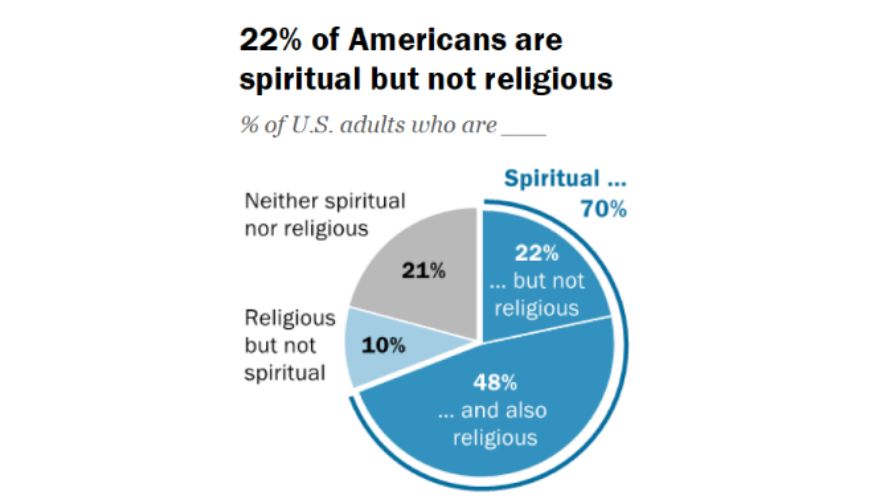
WASHINGTON (BP) — Nearly a quarter of American adults consider themselves “spiritual but not religious,” and a plurality of those say organized religion is divisive and spreads intolerance, Pew Research said in its latest release.
The 22 percent of Americans describing themselves as spiritual but not religious track with recent U.S. declines in traditional religious beliefs and practices, a decline in Christianity in the U.S., and speculations that younger Americans are replacing organized religion with their own hodgepodge of spiritual beliefs and practices.
Still, 70 percent of American adults consider themselves spiritual in some way. A smaller majority, 53 percent, say they are religious. Nearly half, 48 percent, say they are both; while about a fifth, 21 percent, say they are neither.
Pew studied spirituality among U.S. adults for the first time, surveying personal concepts of spirituality, measuring the prevalence of spirituality, and discovering spiritual beliefs, practices and experiences.
“We plan to use our new questions about spiritual beliefs, practices and experiences as a baseline, re-asking them periodically to see which measures are rising, which are falling and which are stable,” Pew said Dec. 7 in releasing the findings. “And rather than imposing a definition of spirituality, we will let survey respondents tell us what it means to them and how they practice it.”
Pew culled its findings from 11,201 U.S. adults included in its American Trends Panel, an online survey panel considered representative of the U.S. population.
Pew asked all respondents whether they observed various rituals or activities as a spiritual practice. Responses included centering or looking inward, 44 percent; spending time in nature, 26 percent; meditating, 22 percent; exercising, 7 percent, and practicing yoga, 4 percent.

Among the spiritual but not religious:
- 73 percent believe in a higher power, but only 20 percent believe in the God of the Bible.
- 89 percent believe people have a spirit or soul.
- 88 percent believe there is something spiritual beyond the natural world, even if they can’t see it.
- 42 percent say religion causes division and intolerance.
- 2 percent attend church services at least weekly.
- Many still claim a religious affiliation, including 21 percent who are Protestant and 12 percent who are Catholic.
- 54 percent are religious unaffiliated.
Many spiritual but not religious people assign spiritual characteristics to nature or created things, as do many in the religious-and-spiritual category.
Comparatively:
- 78 percent of the spiritual but not religious (SBNR) say animals other than humans have spirits or spiritual energies, compared to 56 percent of the religious and spiritual.
- 71 percent of the SBNR see such qualities in mountains, rivers or trees, compared to 46 percent of the religious and spiritual.
- 63 percent of the SBNR see such qualities in cemeteries, graveyards of other memorial sites, compared to 51 percent of the spiritual and religious.
- 42 percent of the SBNR see such qualities in things like jewels, crystals or stones, compared to 25 percent of the spiritual and religious.
Among other top findings:
- 83 percent of all respondents believe people have a soul or spirit;
- 81 percent believe there is something spiritual beyond the natural world, even if we cannot see it.
- 74 percent believe there are some things that science cannot possibly explain.
- 45 percent say they have had a sudden feeling of connection with something from beyond this world.
- 38 percent say they have had a strong feeling that someone who has passed away was communicating with them from beyond this world.
- 30 percent say they have personally encountered a spirit or unseen spiritual force.
The study’s findings are available here.
(EDITOR’S NOTE – Diana Chandler is Baptist Press’ senior writer.)


